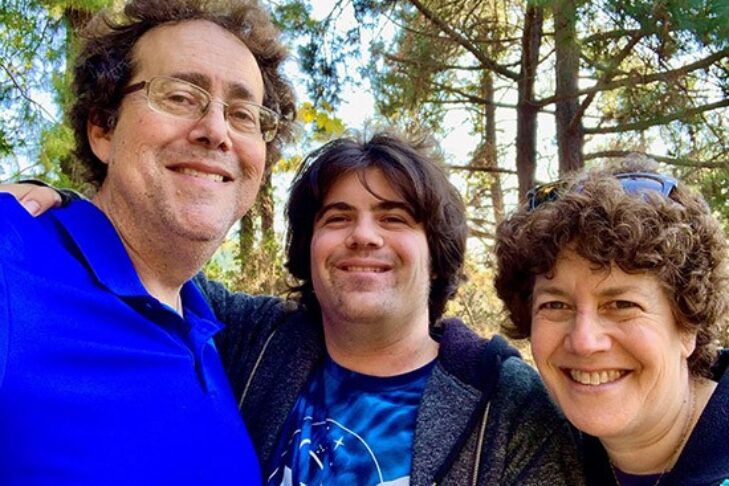Presented virtually by CJP and the Ruderman Synagogue Inclusion Project, “Together in Harmony: A Celebration of the Resiliency of the Human Spirit” conveyed the essence of Jewish Disability Awareness, Acceptance and Inclusion Month (JDAIM). The evening featured Jacob Artson, Elana Shavit Artson, Rabbi Dr. Bradley Shavit Artson, Neshama Carlebach and Rabbi Menachem Creditor.
Jacob Artson, a college student, is a disability activist whose life’s work centers on ensuring everyone’s right to live with dignity, meaning and love. Rabbi Artson is Jacob’s father. He holds the Abner and Roslyn Goldstine Dean’s Chair of the Ziegler School of Rabbinic Studies and is vice president of American Jewish University in Los Angeles.
In his introduction to the event, Rabbi Marc Baker, CJP president and CEO, said: “Rabbi Artson has long been a passionate advocate for social justice, human dignity, diversity and inclusion. And as someone who has sat in his classes and read his books, he is a person who has an incredibly gifted way of bringing the timeless voice of Jewish wisdom to the most pressing issues of today.”
Elana Shavit Artson, Jacob’s mother, supports her son in his advocacy for the dignity and inclusion of all people in Jewish spiritual communities. In addition to being one of his communication partners, she’s also a federal prosecutor specializing in criminal appeals.
Along with Sharon Shapiro, a trustee of the Ruderman Family Foundation, Baker communicated the spirit of the evening as he noted: “I love the title of this event, ‘Together in Harmony.’ Harmony is such a powerful metaphor for what it means to be aware, accepting and inclusive of the human beings, the experiences and the voices around us, because harmony isn’t everyone singing on the same note. Harmony is making space for different notes to come together and to create a powerful, beautiful chorus.”
The night, however, belonged to 28-year-old Jacob. He dazzled with his eloquent observations about his life with autism and his accompanying and insightful Torah interpretations. Jacob types to communicate, and rather than use an app on his iPad with voice output, he prefers “a live person to read my presentations because I like the emotion in the human voice.” Thus, his mother sat next to him and read his impactful words.
Jacob’s love of Jewish learning and his community notably came together a few years ago when he was a scholar-in-residence at his home synagogue, IKAR, in Los Angeles. Conveying his experience of prayer, Jacob said: “When I am praying, I am totally free. I am not stuck in my autistic body and all of its motor challenges. Most of the time, I am working so hard to keep my body regulated that I can’t fully focus on anything else. But when I pray, I allow myself to fully focus on my spiritual experience, and instead of controlling my body, I let it follow my heart and mind.”
Among the highlights from the evening were Jacob’s affecting Torah-based framing of disability and the lessons in resilience that Rabbi Artson has learned from his son.
“I’m a person just like you,” said Jacob. “I am part of a wonderful Jewish family, I vote, I like playing sports and I listen to NPR. The difference between us is that I communicate by typing and most of you communicate by speaking. Although our topic is synagogue inclusion for people with disabilities, I want to propose that including people with disabilities in faith communities really isn’t about disability at all. In my experience, inclusion is really a mindset that each person has dignity and value no matter who they are. We can welcome people who may be in addiction treatment, or have prior gang involvement, or whose views are different from ours, and people just struggling with all of the many challenges that life presents. Our communities will be places that welcome people with disabilities too. I think, in the end, all human beings want to feel we can belong.”
Noted his mother: “One of the most important things I’ve learned now that my child is an adult is it’s not a race. It’s not about how fast you get there. The fact that your child doesn’t do something at one point doesn’t mean they’re not going do it at another point. The fact that your child isn’t good at something doesn’t mean that they won’t find their way. So, focus on the strengths. Don’t get hung up on all the things your child can’t do. Focus on the things they can do, the things they love, the things they’re passionate about, and that will bring them into adulthood, in a place where they can have a meaningful life.”
Rabbi Artson said one of the things his son has taught him is the unhealthy way he sometimes seeks approval from others.
“Jacob doesn’t have the luxury of being able to focus on that,” he said. “He needs the people around him to be able to prioritize what really matters and who really counts and not play to the random stranger who’s giving him a look from across the room or at the airport. Jacob helped crack this liberal San Franciscan, who, in many ways was oppressed by the opinions of strangers. To say, ‘You know what, I notice their look; I can’t care. I can’t care because there’s too much at stake.’ But Jacob would say, ‘It’s not just special needs. All of us need desperately to live in a world in which we can be ourselves, in which everybody in their uniqueness is valued and treasured.’ Jacob ran that home, not as something theoretical, but as life and death.”
Watch the full program below.



